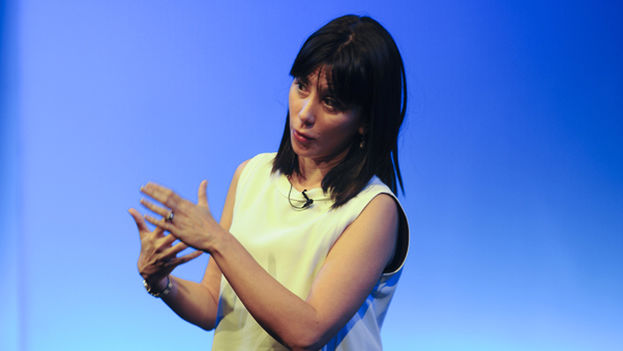
![]() 14ymedio, Yaiza Santos, Mexico, 21 January 2016 – For now, Cuba will not celebrate the Hay Festival planned for this coming week in Havana, as confirmed by the event organizers. The Hay Festival originated in the Welsh town of Hay-on-Wye in 1988, and since 1996 has been celebrated in several foreign cities, among them Kells (Ireland), happening now, Segovia (Spain), Mexico City, Arequipa (Peru) and Cartagena de Indias (Colombia).
14ymedio, Yaiza Santos, Mexico, 21 January 2016 – For now, Cuba will not celebrate the Hay Festival planned for this coming week in Havana, as confirmed by the event organizers. The Hay Festival originated in the Welsh town of Hay-on-Wye in 1988, and since 1996 has been celebrated in several foreign cities, among them Kells (Ireland), happening now, Segovia (Spain), Mexico City, Arequipa (Peru) and Cartagena de Indias (Colombia).
The news that the Cuban capital would host a Hay Festival event as a part of the Hay Festival in Cartagena was announce in the first week of December, along with the controversy that accompanied that announcement. According to complaints from artists in exile, the festival organizers had proposed names of Cuban authors, among them Wendy Guera, Ena Lucia Portela and Yoani Sanchez, but “the pressure on the organizers from the Ministry of Culture finally forced them to not be included in the program.” Another source said that the organization simply accepted “an official list” that was presented to them.
Asked about the issue, the Hay Festival organization flatly refused to accept any kind of censorship, saying that the program in Havana was not closed, and that although there was still no final guest list, conversations with the Cuban Book Institute went “very well.” Cristina Fuentes, director of the Hay Festival for Latin America said, “We have suggested foreign participants, talking with Cubans and the suggestions are all first-rate.” She emphasized, “There is no censorship nor problems right now.”
On 24 December the Cuban News Agency (ACN) reported that the Havana Hay Festival would take place on 25-26 January. Quoting Jesus David Curbelo, the director of the Dulce Maria Loynaz Cultural Center and “one of the organizers of the event for Cuba,” the ACN confirmed that it was, ”just an experiment” and that there would be “two key events: literary workshops in the morning and author talks in the afternoon.”
The international guest list included Daniel Mordzinski, Andrés Trapiello, Jon Lee Anderson, Guadalupe Nettel and Hanif Kureishi, while Cuban guests included Pedro Juan Gutiérrez, Antón Arrufat, Mirta Yáñez, Reynaldo González, Marilyn Bobes, Dazra Novak and Rafael Grillo. Conspicuous by their absence were authors living in Cuba who had participated in other versions of the Hay Festival, such as Wendy Guerra, Ena Lucia Portela and Yoani Sanchez.
In addition, the ACN mentioned that the Hay Festival was being promoted by Bogota 39, an initiative that in 2009 brought together 39 young Latin American writers under 40, “all with one or more works published and read in their countries, but unknown beyond their borders,” forgetting that one of these was Wendy Guerra.
An official cable echoed the Spanish agency EFE, and hence, the Mexican newspaper El Universal and the Colombian magazine Arcadia. However, the Hay Festival did not comment publicly and insisted to 14ymedio, “The program is not yet closed.” Their idea, they said, was “to start with something very small and grow,” adding, “We don’t have to include all the Cuban authors the first year.”
By that time the controversy had jumped to the social networks. The Twitter account @HayFestivalCuba, now cancelled, denounced the planned event, saying “No to censorship at the Havana Hay Festival.” Some tweets were directed to the guests themselves according to the list published by the official press, such as the journalist Jon Lee Anderson and the writer Hanif Kureishi. Also participating in the exchanges on Twitter were the Mexican musician Armando Vega Gil, and the Barcelona writer Lolita Bosch.
This Tuesday, Cristina Fuentes told 14ymedio that the Hay Festival has postponed the project in Havana. “It is complicated for a number of reasons and we are going to leave it for another year,” she said, without clarifications. In a more extensive message, she said: “The organization of an event like this can only be done if the conditions are right for its realization, which could not be guaranteed, so we are not going to go forward with the project. It is because of this that our organization is not announcing, right now, the scheduling of this series of events on the island.” Fuentes concluded, “We would love to work in Cuba and hope it will be possible in the future.”
Defined as a non-profit company, the Hay Festival aims, according to its website, for the “dissemination of literature at local and international levels to promote dialogue and cultural exchange, education and development”, but has not been without controversy. In February 2015, it canceled the event that had been held in Xalapa, Veracruz since 2011, after pressure from Mexican intellectuals who denounced the partisan use of the festival by the government of Veracruz, and noted that 11 journalists had been killed and four others had disappeared in that Mexican state.
